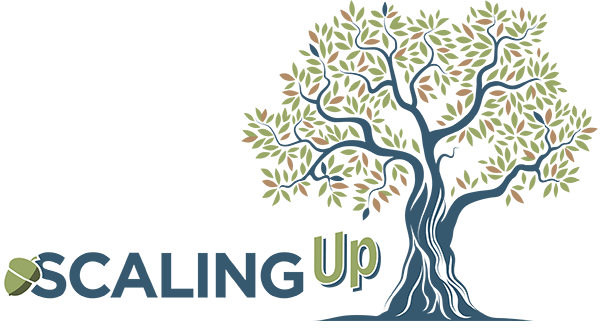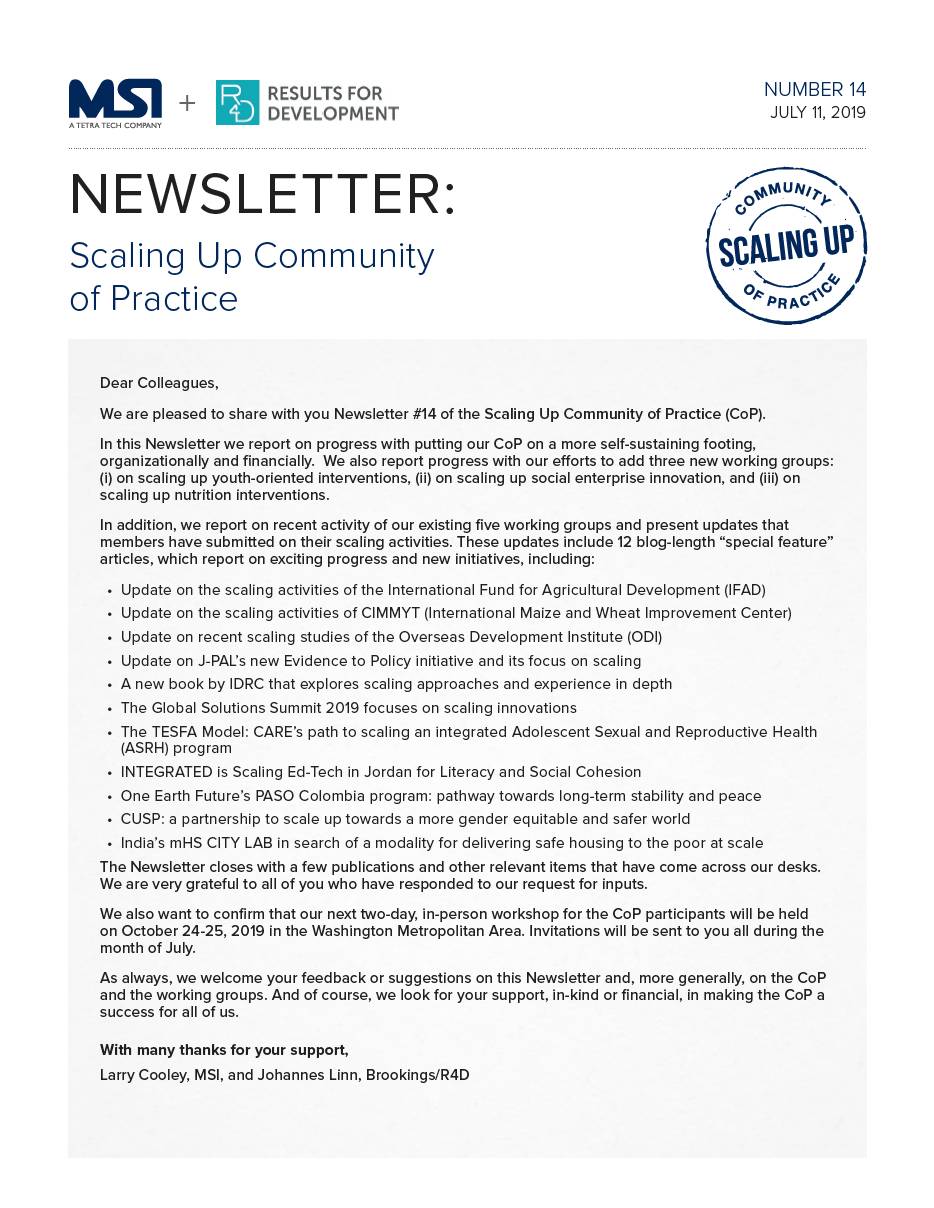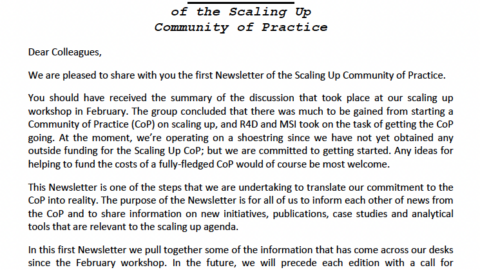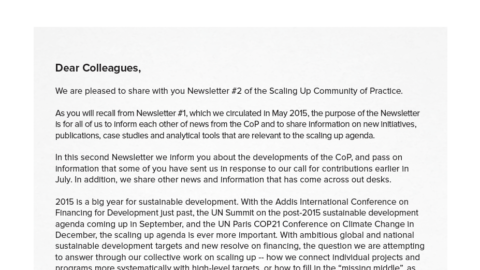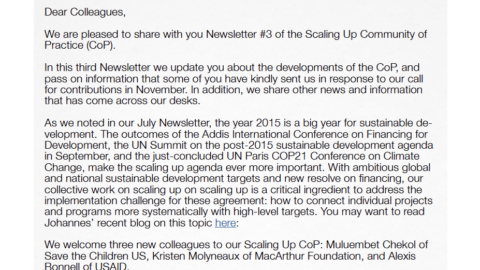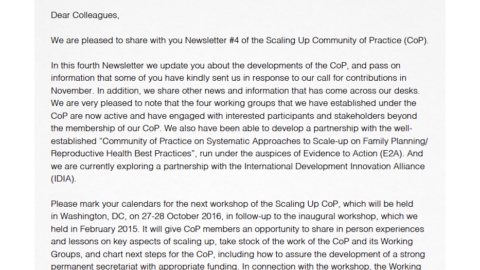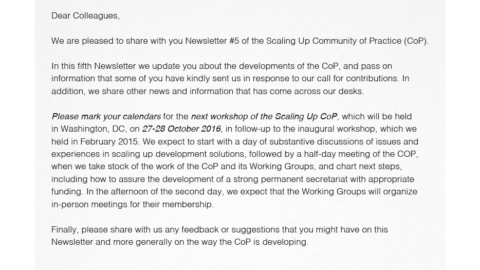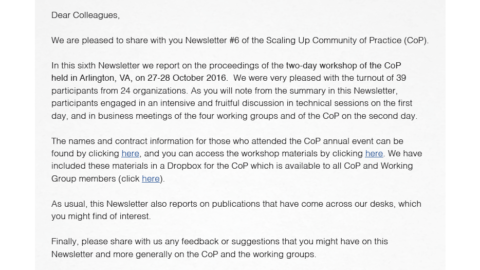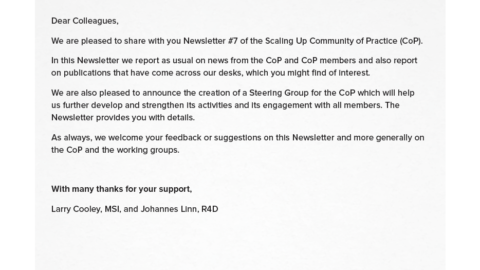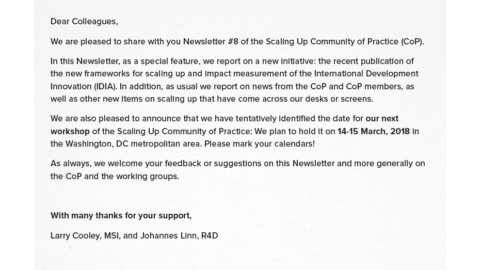New CoP Initiatives
1. Toward a sustainable Scaling Up CoP
As we noted in Newsletter #13, our Scaling Up CoP is now well into its fourth year of existence and has grown into a network and platform of knowledge exchange for some 400 members from about 150 organizations. About two years ago, Larry and Johannes organized an Executive Committee of CoP members to help them manage the CoP and to explore options for establishing a sustainable institutional and financial structure of the initiative. Among our evolving goals is to involve more participants from the Global South and to move gradually from an organization that is carried by purely voluntary efforts to one that allows for funding of core institutional functions through sustaining financial contributions.
The Executive Committee settled on a model, at least for the next few 2-3 years, in which 5 or 6 organizations or individuals agree to be “Sustaining Members” making a contribution in cash or in kind of $10,000-$30,000 per year; and an additional group of organizations or individuals support the CoP as “Contributing Members” at a level of $1,000-$3,000 per year in cash. Sustaining Members will be invited to join the CoP’s Executive Committee. Those organizations and individuals not in a position to provide financial support will continue to be full members of the CoP and encouraged to participate in all its activities.
We have so far obtained commitments from five organizations to become Sustaining Members and received a commitment by one member to be a Contributing Member. We hope to attract additional Sustaining Members in the coming months and as many Contributing Members as possible. Anyone willing to consider becoming a Sustaining or Contributing Member, please contact Larry or Johannes at your earliest convenience at lcooley@msi-inc.com or jlinn@ brookings.edu.
2. Three new working groups on youth and social enterprise innovation
We are also very pleased to report that we have added three new working groups to the original five working groups in education, health, agriculture and rural development, fragile states, and monitoring and evaluation. The three new working groups are:
- A Working Group on Scaling Up Youth Employment led by Elizabeth Vance from the International Youth Foundation and Alice Gugelev of Global Development Incubator.
- A Working Group on Scaling Up Social Enterprise co-led by Isabel Guerrero, founder of IMAGO Global Grassroots, and by the Elaine Tinsley, who is in charge of the World Bank’s Social Enterprise Innovation Unit.
- A Working Group on Scaling up Nutrition Interventions, led by Chytanya Kompala of the Eleanor Crook Foundation.
Anyone wishing to join any of the eight working groups is invited contact the group leaders listed in the next section below.
Working Groups of the Scaling Up Community of Practice
The following comments summarize activities of the five working groups that were active during the previous quarter. These are listed below with the names and e-mail addresses of the coordinators. For more information on the agenda of each working group and on how to join a working group, please contact the respective coordinator(s) or reach out directly to Larry (LCooley@msi-inc.com) or Johannes (jlinn@brookings.edu).
| Working Group topic | Working Group coordinators | Current status of Working Group (WG) |
|---|---|---|
| Scaling Up in Education | Nitika Tolani ntolani@msi-inc.com | As reported in Newsletter #13, the Education Working Group kicked off 2019 with an exciting webinar focused on “Supporting, Learning, and Documenting Scaling Efforts – Ways to Bridge Research and Practice,” led by Jenny Perlman Robinson, Molly Curtiss, and Patrick Hannahan with the Center for Universal Education at Brookings. A recording of the webinar can be found at https://msiworldwide.egnyte.com/dl/xs1sMSnApK (password protected; the password is Education2019). Looking ahead, a survey link will be sent requesting ideas for activities and events members are interested in leading and/or participating in 2019 and 2020. |
| Scaling Up in Fragile States | Larry Cooley LCooley@msi-inc.com Jonathan Papoulidis jpapouli@worldvision.org | The Working Group (WG) is planning its next meeting in late August, early September which will include a presentation from a COP/WG member on a topic of interest to the group. CoP members interested in sharing their work or expertise with the group are encouraged to reach out to the co-chairs. The WG’s scope of work involves: (a) applying scaling up approaches to bridge humanitarian and development interventions; (b) elaborating on the obstacles to scaling in fragile states and how they have been overcome, or when scaling should not have been attempted (possibly through case studies); (c) promoting adaptive, resilient and politically smart methods for scaling; (d) examining ways to strengthen country institutions and mobilize private sector finance for sustainable scaling in a range of fragile contexts. |
| Scaling Up in Agriculture and Rural Development (ARD) | Maria Elena Mangiafico (IFAD) m.mangiafico@ifad.org Frank Place (IFPRI) F.Place@cgiar.org Laura Schreeg (USAID) lschreeg@usaid.gov Lennart Woltering L.Woltering@cgiar.org | The ARD WG welcomed several new members in the last quarter especially following the Scaling Up in Agriculture conference at Purdue and the launch of the Scaling Up Sourcebook last April. New members are eager to share their experiences and contribute to the discourse on scaling up agriculture and rural development. The WG will meet virtually before the scaling up conference in DC to hear from new members and learn about their experiences including scaling agricultural innovations; sustainable systems change; and scaling access to veterinary services. The working group will also discuss their participation/contribution to the CoP’s in-person workshop in October. |
| Monitoring and Evaluation (M&E) for Scaling Up | Larry Cooley LCooley@msi-inc.org | The M&E Working Group did not have a meeting during this quarter but is planning on having a meeting in July or August. If you are a member of the Working Group, watch for a notification. If you are not a member – or are not sure if you are a member – and would like to join, send an email to Larry Cooley at lcooley@msi-inc.com. |
| Community of Practice on Systematic Approaches to Scale-up on Family Planning/Reproductive Health Best Practices | Laura J. Ghiron (U.Mich.) ljghiron@umich.edu | USAID recently extended the E2A Project for a 9th year—until September/October 2020—which will make it possible for the Working Group to continue its exciting work under E2A/ExpandNet’s leadership. In March, the E2A/ExpandNet-led Community of Practice on Systematic Approaches to Scale-up held its quarterly Resource Team meeting, during which participants reviewed the following experiences: • MSI’s multi-sectoral work, • NIH Fogarty Center’s application of Implementation Science tools to improve scale-up of health interventions, • CARE’s scale-up of an adolescent health and literacy intervention in Ethiopia, • E2A’s application of a systematic approach in Côte d’Ivoire • In June, the Resource Team convened again to focus on new tools to support scale-up, with presentations on the following: • PATH’s scale-up tools for its DMPA-SC self injection program, • The Maternal and Child Survival Program Managers’ Guide to scaling up RMNCAH interventions, • CARE’s Designing for Scale “learning lab” tools, • ExpandNet’s Implementation Mapping Tool If readers would like any of these presentations, please contact Laura or Ruth using the emails above. |
| Social Enterprise Innovation | Isabel Guerrero (IMAGO) iguerrero@imagogg.org Elain Tinsley (World Bank) etinsley@worldbank.org | The working group on scaling social enterprise innovation kicked off with a teleconference on May 16th, 2019, which included an introduction to the World Bank’s work on scaling social enterprises, a synthesis of member input on topics of interest, then detailing plans for next steps. Members of the working group were interested in knowledge exchange on several key areas, including various funding models, different ways of scaling, understanding scaling through government/donor partnerships, and measuring impact. The working group’s next meeting will be in September and will include a discussion with IDinsight on using evidence to adapt and scale programs in new contexts. Our membership is diverse and includes representation from a variety of sectors, including non-profits, multilaterals, government, foundations, and academia. |
| Youth Employment | Elizabeth Vance (International Youth Foundation) e.vance@iyfnet.org | The Youth Employment Working Group met on June for its inaugural meeting and agreed to (i) empower participants to take powerful action to change the labor market system in reducing youth un/underemployment at the scale of the problem; and (ii) determine what changes we could to make to our practice, evidence and/or field to play that role effectively. In it’s next meeting in July -- day and time yet to be decided -- the group with consider what it wants to change and how it will work together. |
| Nutrition Working Group | Chytanya Kompala (Eleanor Crook Foundation) chytanya@eleanorcrookfoundation.org | The Nutrition Working Group recently kicked off and is planning the first virtual meeting on September 5th, 2019. In the coming weeks, the Working Group leads will solicit input from Working Group members from 15 global nutrition organizations including some existing COP members on objectives, an annual work plan to guide the forthcoming activities, and topics for discussion during Working Group meetings. As the Nutrition Working Group is in its infancy, this year will be focused on developing the Working Group’s membership and collecting input from members on key areas of focus. The Nutrition Working Group is particularly focused on developing a diverse membership, to include several donor organizations and representatives from low- and middle-income countries. If you are interested to join the Nutrition Working Group, please contact Chytanya Kompala at the Eleanor Crook Foundation (chytanya@eleanorcrookfoundation.org). |
Special Features
Update on the scaling activities of the International Fund for Agricultural Development (IFAD)
In striving to maximize its contribution towards the 2030 Agenda, IFAD is in the process of completing a significant portion of the major reforms forseen in its business model. The Fund has also set its priorities in the period 2019-2021, committing to scaling up investments in mainstreaming environment and climate change, youth, gender and nutrition. In order to do so, the Fund has developed strategies and concrete action plans for each of these critical themes (linked above) and a framework for implementing transformational approaches. IFAD is also strengthening several scaling “enablers”, for example, through a new cofinancing strategy and action plan, a project restructuring policy, a new knowledge management strategy, and a new private sector strategy to be approved by the Executive Board in September.
PRIME Africa (Platform for Remittances, Investments and Migrants’ Entrepreneurship in Africa)(https://www.ifad. org/en/web/knowledge/publication/asset/41112400), a new EUR 15.1 million program managed by IFAD’s Financing Facility for Remittances (FFR), will help maximize the impact of remittances for millions of families through innovations, partnerships and scalable products that promote, cheap and fast remittance transfers.
IFAD’s Executive Board recently approved several new Country Strategies that include scaling ambitions for the period 2019-2024. The Senegal country program will support in-country and sub-regional partnerships for scaling up good practices and implementing pro-poor policy in rural areas. Burkina Faso aims to scale up in natural resource management practices with a focus on the resilience of small farms, sustainable land management, agroecology and other integrated approaches. In the Gambia IFAD will look to its strategic partnerships with government, donors and relevant private sector operators to cofinance the scaling up of the key innovations.
Recent project completion reports show interesting scaling up results such as: Indonesia’s Village Development Project (VDP); India’s Tejaswini Rural Women’s Empowerment Programme; Ethiopia’s Community-based Integrated Natural Resources Management Project (CBINReMP); Paraguay’s the Proyecto Paraguay Inclusivo (PPI); Ecuador’s IbarraSan Lorenzo Corridor Territorial Development Project; Congo’s Agricultural Value Chains Support Development Programme; Central America and Dominican Republic’s Programa Diálogo Rural Regional (PDRR); and Uganda’s National Agricultural Research Organisation (NARO). Other projects, such as in Cote d’Ivoire (https://www.ifad.org/en/web/operations/project/id/1100001589/country/cote_divoire) and Nepal, did not produce such tangible results. These projects could have benefitted from concrete strategies for managing knowledge and innovations and activities aimed at facilitating scaling up.
Contact: Maria Elena Mangiafico (m.mangiafico@ifad.org)
Update on the scaling activities of CIMMYT (International Maize and Wheat Improvement Center)
New publication: “Scaling – from “reaching many” to sustainable systems change at scale”
A group of researchers from the CIMMYT, Jan Ubels from SNV Netherlands Development Organization, and Larry Cooley of Management Systems International, understand why successful (pilot) projects are no guarantee for success at scale. Their findings are now published in the article “Scaling – from “reaching many” to sustainable systems change at scale: A critical shift in mindset”. The authors argue that reaching the transformational goals of the SDGs requires interventions
to be seen as a building block within a system of other initiatives aiming in the same direction. They go on to suggest that two major problems undermine efforts to foster scale through development projects. First, (pilot) projects are usually set up in a very controlled environment that does not reflect the real-world conditions that prevail at scale. Second, confusion on what scaling is and how it can be pursued often results in a narrow focus on reaching numbers. Counting household adoption at the end of a grant project is a poor metric of whether these people can and will sustain adoption after the project closes, let alone if adoption will reach others and actually contributes to improved livelihoods. The authors call for changing the scaling narrative from short term and piecemeal innovation to a narrative that recognizes the systemic nature of problems and solutions to achieve sustainable change at scale. This requires a different mindset, skills, and ways of collaborating than what we consider normal today. Finally, the authors present a number of frameworks that help to assess the scalability of innovations, design for scale from the onset of projects, and systematically think through key elements, ingredients, or success factors.
New Publications and blogs
Maria Boa, “Scaling farming innovations: what, why and how”. CIMMYT’s News. June 2019. https://www.cimmyt.org/news/ scaling-farming-innovations-what-why-and-how/
Events
- Symposium on Scaling up Sustainable Intensification in Smallholder Systems in the upcoming ASA-CSSASSSA International Annual Meeting https://www.acsorg/. The American Society of Agronomy, the Crop Science Society of America, and the Soil Science Society of America will host approximately 4,000 scientists, professionals, educators, and students at the 2019 International Annual Meeting, “Embracing the Digital Environment,” on November 10-13, 2019, in San Antonio, Texas. Invited speakers: Lennart Woltering and Maria Boa of CIMMYT.
- November 13-16 in Minneapolis. American Evaluation Association conference about issues of scale, scalability and scaling in evaluation. Gargani, Wind and McLean from IDRC, and Woltering and Boa (CIMMYT) will moderate a panel discussion
Contact: Lennart Woltering (L.WOLTERING@cgiar.org)
Update on recent scaling studies of the Overseas Development Institute (ODI)
There are a number of recent ODI publications that address getting to scale including the following:
“Monitoring and learning for country-level portfolio decision-making and adaptation” (https://www.odi.org/sites/odi.org.uk/files/resource-documents/12713. pdf) (May 2019; by Anne Buffardi, Paige Mason, Claire Hutchings and Samuel Sharp)
Most measurement and adaptive management approaches were developed for and from individual projects. This briefing aims to guide measurement and management of country-level portfolios of work. It identifies potential purposes portfolio-level analyses can fulfil, types of adaptation, and the relative role of monitoring, learning and evaluation (MEL).
Drawing on reviews of practice from the United States Agency for International Development (USAID) and the United Kingdom Department for International Development (DFID), guidance notes, and experiences of members of the Global Learning for Adaptive Management (GLAM) initiative, it offers recommendations and considerations that are particularly relevant for this level of analysis and management.
“Transforming fragile states: forging a new consensus” (June 2019; by Alex Their)
A group of world leaders, including the late UN Secretary-General Kofi Annan and former President of Liberia Ellen Johnson Sirleaf, came together with experts under the leadership of ODI, The Rockefeller Foundation and the US Institute of Peace to draft a set of principles and approaches to catalyze change. The Bellagio Consensus that emerged from these discussions seeks results at scale in fragile settings.
“The potential of Nepal’s social security allowance schemes to support emergency flood response” (https://www.odi.org/publications/11346-potential-nepal-s-social-security-allowance-schemes-support-emergency-flood-response) (May 2019, by Rebecca Holmes, Fiona Samuels, Martin Evans, Anita Ghimire and John Twigg)
Nepal’s approach to disasters has shifted in recent years to promoting resilience and preparedness as well as response. In addition, innovative approaches by emergency and development actors have sought to respond to an increasing scale of need. The role of social protection in responding to shocks is one of these approaches and has seen increased high-level policy attention in recent years. This includes a focus on the potential use of cash-based responses through the existing social security allowance (SSA) system to respond to emergencies (as was done in the 2015 Ghorka earthquake), as well identifying the need for feasible and sustainable approaches to respond to shocks under the evolving federal system.
“Scoping and design for taking forecast-based early action to scale: three case studies”
Working and discussion papers (April, 2019) by Thomas Tanner, Lena Weingartner, Florence Pichon, Bill Gray, Kiswendsida Guigma, Jafar Iqbal, Simon Levine, David MacLeod, Khairun Nahar, Kaiser Rejve, Courtenay Cabot Venton, Catalina Jaime, Martin Todd and Stephen McDowell
The papers describe and contrast three types of humanitarian financing-delivery systems and what they can teach us about scaling up mechanisms for forecast-based early action.
Contact: Alastair McKechnie (alasmck@gmail.com)
Update on J-PAL’s new Evidence to Policy initiative and its focus on scaling
Well-designed randomized evaluations test theories and provide general insights about how programs designed to address poverty work. These insights, when combined with descriptive data and a deep understanding of the local context and institutions, provide useful guides for policy design.
J-PAL’s new Evidence to Policy case studies explore how J-PAL affiliated researchers and staff, along with government and NGO partners, have drawn on evidence produced by randomized evaluations to inform policy changes around the world. The new section includes 17 case studies, with more on the way, that are meant to illustrate the numerous pathways through which randomized evaluations are shaping policy and practice, including by:
- Shifting global thinking: Knowledge generated by randomized evaluations has fundamentally shaped our understanding of social policies.
- Institutionalizing evidence use: Organizations, including governments and large NGOs, have institutionalized processes for rigorously evaluating innovations and incorporating evidence into their decision-making.
- Applying research insights: Lessons from randomized evaluations have informed the design of programs.
- Adapting and scaling a program: Programs originally evaluated in one context have been adapted and scaled in others.
- Scaling up an evaluated pilot: Partners have replicated and expanded a successful evaluated pilot to similar contexts.
- Scaling back an evaluated program: Partners have scaled down, redesigned, or decided to not move forward with programs that were evaluated and found to be ineffective.
To date, over 400 million people have been reached by programs that were scaled up after being evaluated by J-PAL affiliated researchers. Millions more have been impacted by the many other ways in which evidence from randomized evaluations has informed policy, but where beneficiaries are more difficult to count. Current examples include:
- A shift in thinking by donor and development agencies to eliminate user fees after more than a dozen randomized evaluations showed that charging fees for preventive health products, such as malaria bed nets, dramatically reduced take-up;
- The decision to scale back a biometric health provider monitoring program in Karnataka state, India, after an evaluation showed that the government was unwilling to enforce penalties associated with provider absenteeism;
- The decision to replicate and scale the “Graduation approach”–a multifaceted livelihood program first designed by Bangladeshi NGO BRAC–in multiple locations worldwide based on evidence that it has been shown to help the poorest women and their households transition into more sustainable livelihoods.
In addition, the website includes an Evidence to Policy resources page. Here you can find reflections from J-PAL affiliates and staff on how to leverage evidence to inform policy, as well as practical frameworks and guidance for adapting evidence from one context to another, assessing whether a program is ready for scale, understanding the value of evaluation in scaling policies, and more.
Contact: The E2P team at E2P@povertyactionlab.org.
A new book by IDRC explores scaling approaches and experience in depth
The world is changing rapidly, and persistent problems like environmental degradation or accelerating inequality impact the entire global community and press us to do better for each other and our environment. For organizations and individuals working to tackle big social issues and create positive change, scaling impact is a common goal and a well-founded aim. Challenges like these seem to demand a significant scale of action, and here the authors argue that a more creative and critical approach to scaling is both possible and essential.
“Scaling Impact”, a just released book authored by Robert McLean and John Gargania and published by IDRC, introduces a new and practical approach to scaling the positive impacts of research and innovation. Inspired by leading scientific and entrepreneurial innovators from across Africa, Asia, the Caribbean, Latin America, and the Middle East, this book presents a synthesis of diversity and grounded ingenuity. The result is a different perspective on how to achieve impact that matters, and an important challenge to the predominant ‘bigger-is-better’ paradigm of scaling. To encourage uptake and co-creation, the authors present actionable principles that can help organizations and innovators design, manage, and evaluate scaling strategies. “Scaling Impact” is a call to action for all actors concerned with social innovation, to think critically about scaling up scientific research and to be more scientific in how we scale. The book can be downloaded https://www.idrc.ca/en/book/ scaling-impact-innovation-public-good.
The Global Solutions Summit 2019 focuses on scaling innovations
The Global Solutions Summit (http://www.globalsolutionssummit.com) convened for the second straight year at United Nations Headquarters in New York City on the day before the start of the official UN Multistakeholder STI Forum. (May 16, 2019) The overarching theme of the Global Solutions Summits is scaling up technology deployment for the SDGs in emerging markets, especially the Least Developing Countries.
The UN’s 2030 objective is to achieve the SDGs while “leaving no one behind.” At a minimum, attaining this noble objective requires a two-step process. The first is to focus R&D on the development of scientific innovations that generate high performance, radically-affordable products — the challenge of affordable excellence. Examples featured at GSS 2019 include Global Good’s development of technological solutions specifically geared to the needs of smallholder farmers and Vanu’s work to “connect the unconnected” by providing lowcost wi-fi access in remote villages.
The indispensable second step is getting these scientific discoveries into the hands of the hundreds of millions of people in tens of thousands of urban and rural communities in dozens of countries. This is the so-called deployment challenge. The Global Solutions Summit focuses on this second challenge.
This deployment process is the domain of business models, supply chains, community organizing, product marketing, and finance. It is the purview of entrepreneurs, community leaders, equipment vendors, logistics experts, payment mechanisms, finance for social enterprises and consumers, government officials, foundations, NGOs, social enterprises, SMEs, large corporations, and local universities who comprise the deployment ecosystem.
GSS 2019 explored how we can build a more effective and efficient deployment ecosystem – one that enables social enterprises, SMEs, NGOs, and foundations to reach more people in the countries where they are already working and transfer their deployment know-how to more countries at a pace and on a scale commensurate with the goal of achieving the SDGs by 2030. A more detailed Background Discussion Paper is available here. A synthesis of the 2019 Summit discussion will be posted on the Summit website in late-summer.
Contact: Alfred Watkins (alfred.watkins07@gmail.com)
The TESFA Model: CARE’s path to scaling an integrated Adolescent Sexual and Reproductive Health (ASRH) program
To meet the unique needs of married adolescent girls in rural Ethiopia and address the gap in global programming for this population, CARE created the TESFA program in 2010. TESFA – ‘hope’ in Amharic – sought to mitigate the harmful effects of child marriage by creating opportunities for girls to engage in economic activities, learn sexual reproductive health knowledge, and improve their communication and negotiation skills through peer-based solidarity groups. Recognizing that girls’ lives cannot be transformed without challenging and changing restrictive societal norms, TESFA also directly engaged village elders, religious leaders, health workers, mothers-in-law, and girls’ husbands in reflective dialogue and action in support of adolescent girls’ access to information and services. The ‘Ex Post Evaluation’ of TESFA, carried out four years after the program ended, showed that the improved sexual and reproductive health and economic empowerment outcomes and process were not only sustained, all 196 of the girls and community groups surveyed continue to meet, and as much as 60% of the girl groups have self-replicated to include more girls. In 2018, CARE launched an investigative research process to inform the design of a new more scalable and impactful iteration of TESFA, called TESFA+. This comprised a systematic mapping of the status of TESFA groups across the intervention areas as well as of potential future implementers, and an in-depth qualitative evaluation of the conditions required for program scale-up, success and sustainability. TESFA+ is now in the process of being scaled up using insights from end-users and local government partners, through integration of the model into government structures, working with diverse platforms at national and regional levels, and leveraging existing forums. Additionally, TEFSA+ is exploring ways to enhance the social capital for girls through inter-group connectivity and building solidarity that supports replication of the model and reach to more girls.
Contact: Feven Mekuria (feventassaw.mekuria@care.org) and Ryan Derni (Ryan.Derni@care.org)
INTEGRATED is scaling Ed-Tech in Jordan for literacy and social cohesion
In Jordan one third of refugees are school-aged children between 5-17 years old. To absorb the influx of these children, Jordan’s Ministry of Education has established double-shifted public schools. However, the refugee crisis has placed complex demands on teachers who face classrooms of students coming from two or more distinct national groups, some of whom have escaped the trauma of conflict and destruction, and whose respective communities are seen as competing for finite economic resources. Teachers are unequipped to handle the ensuing bullying and conflicts in the classroom and schools, resulting in concerns that these children risk becoming part of a Lost Generation.
In response to this challenge, INTEGRATED, in partnership with Little Thinking Minds, an award winning ed-tech company, developed a multi-media approach to tackling social cohesion in the classroom. The solution – Let’s Live in Harmony – is a multi-faceted approach to respond to the educational needs of Syrian and Jordanian students in double-shifting schools. An ed-tech platform enables children to strengthen literacy while building a vocabulary of self, other, acceptance, respect and harmony through a digital leveled library of stories, while a program of teacher-led activities enable the class to put those principles into practice.
Proven Model: Let’s Live in Harmony is built off a proven foundational model tested and evaluated with grade two children in public schools, funded by USAID All Children Reading Grand Challenge for Development. Through a randomized control trial, the program was proven to statistically improve children’s literacy, as tested through EGRA in syllable segmentation, oral reading fluency, and reading comprehension. It has also resulted in increased desire to attend school, improved academic confidence, and improved social emotional learning in is initial piloting.
Scaling in Public Schools: With support from UNICEF and UK Aid, the original pilot expanded to four grades, with stories focusing social cohesion, supplemented by teacher-led activities in the classroom. Content was developed in close collaboration with the Ministry of Education, and is delivered within the Ministry’s co-curricular activity block. Let’s Live in Harmony is currently being delivered by 400 teachers to 20,000 Syrian and Jordanian children across four grades, in 100 double-shifting schools.
Link to Video: The Challenge and Potential of Ed-tech
Contact: Nedjma Koval (nkoval@integratedinternational.org)
One Earth Future’s PASO Colombia program: pathway towards long-term stability and peace
One Earth Future’s PASO Colombia program (Paz Sostenible para Colombia, translated as Sustainable Peace for Colombia) is committed to working with local communities to identify and develop economic opportunities, spur job growth, strengthen the social fabric of the country, and encourage communities to be accountable for maintaining long-term stability and peace.
PASO Colombia has developed a comprehensive, community-based approach to peacebuilding through its Rural Alternative Schools model (ERAs for its acronym in Spanish). At their core, ERAs are local hubs for strengthening communities to successfully reintegrate ex-combatant and promote sustainable peace. By enabling the collaborative space for technical training on agricultural skills, creating access to capital and land, and identifying markets for participants to sell their goods via Co-ops and Collaborative Commercial Partnerships, ERAs provide livelihood opportunities and a sustainable path towards peace and reconciliation in Colombia.
PASO’s ERA model was designed and initially implemented focusing on the social and economic local reincorporation of ex-combatants after the signing of the historic Havana Peace Accord. However, as the model began to show success as a cost-effective local platform for fostering community cohesion, social stability, and economic development, it became apparent that expanded scale was both possible and necessary. In partnership with a growing number of cross-sector allies, this “Phase II” effort is beginning to operate at a greater scale in three ways:
- The types of beneficiaries: in addition to ex-combatants and community members, ERAs now include other local actors affected by the presence of armed conflict, including coca-growing farmers, and an ever-growing number of Venezuelan migrants.
- The number of direct beneficiaries.
- Funding sources: Phase II involves not only linking up with UNODC, the Colombian government and other international philanthropies for larger funding projects, but also leveraging the ERAs as an investment platform for a multi-tiered blended finance scheme that seeks to catalyze international impact investment funds and bonds.
For more information on PASO Colombia or the One Earth Future Foundation visit https://oneearthfuture.org/program/paso-colombia
Contact: Aydin Shahidi (ashahidi@oneearthfuture.org)
CUSP: a partnership to scale up towards a more gender equitable and safer world
CUSP is a group of nine organizations with robust experience in developing social norms change methodologies that are being scaled across a variety of regions and contexts by the Center for Domestic Violence Prevention (CEDOVIP), Intervention with Microfinance for AIDS and Gender Equity (IMAGE), the Institute for Reproductive Health at Georgetown University, the Oxfam-initiated “We Can” campaign, Puntos de Encuentro, Raising Voices, Salamander Trust, Sonke Gender Justice, and Tostan. CUSP members currently support programs in Latin America, Africa, the Pacific, the Caribbean, and South Asia.
“On the CUSP: the politics and prospects of scaling social norms change programming” explores learning from methodologies and experiences from five CUSP programs – GREAT, IMAGE, SASA!, Stepping Stones, and Tostan–on scaling social norms change initiatives for gender equality to prevent violence against women and girls and improve sexual and reproductive health and rights. The discussion raises political questions around the current donor landscape including the issues with short-term and under-resourced projects, who is well positioned to lead the scale-up, the demand for funding feminist organizations, and the challenges with the current evaluation paradigm for measuring social norms change at scale. Stay up to date with CUSP here: https://bit.ly/30hpa1B
Contact: Rebecka Lundgren (rebecka.lundgren.irh@gmail.com)
India’s mHS CITY LAB in search of a modality to delivering safe housing to the poor at scale
In India, 8 people die every day due to a building collapse according to estimates from the National Crime Bureau of India. The unfortunate fact is that over 80% of low-income households find affordable habitat in informal settlements, continue to build and live in non-engineered structures. As some have observed, “earthquakes don’t kill people, the buildings do”.
10 years ago, mHS CITY LAB, an Indian start-up interdisciplinary social enterprise, think-tank and implementing organization with a human-centered design approach, started its quest to design and pilot innovative, scalable solutions to foster the development of resilient and inclusive cities. It began with the mission for cities to improve quality of self-built housing.
Households were offered a bundled product including access to a home-upgrade loan through a partner micro finance institution with mandatory technical assistance. While this innovative housing finance faced challenges regarding property rights, as well as legal and policy obstacles, it was eventually able to secure the needed authorities and began scaling outreach with the support of a US$ 100 million World Bank projects (See video of Low Income Housing Finance Program, World Bank India) [https://nam01.safelinks. protection.outlook.com/?url=https%3A%2F%2Fwww. youtube.com%2Fwatch%3Fv%3D8Gr-iNT7VrI&data=01%7C01%7Cjlinn%40brookings.edu%7C26db23c4d5bc4011fd7108d6f96f225a%7C0a02388e6178
45139b8288b9dc6bf457%7C1&sdata=Rhu%2FEUQjpKWkr6iCEFCCubaR8qG8l1p1vxdNpKETqHA%3D&reserved=0]
Scaling door-to-door technical assistance on demand to communities that self-build housing proved to be operationally prohibitive and required a serious rethink on roles and modes of delivery. mHS opted for provision of last mile housing support services through a digital platform called NEEV that provides customized inputs, such as estimates, bill of quantities, and construction manuals that can be co-created with, and SMS’d to, the end user. Adoption of digital platforms for housing was met much skepticism, especially from the technical community, on the grounds that the presence of a certified engineer or architect is hard to replace. Who shares liability? How does one trace and certify quality? Is empowerment through access to information sufficient or is this in the domain of regulation? How can we measure impact? These are the questions mHS CITY LAB seeks to answer. For more information see www. mhscitylab.org.
Contact: Rakhi Mehra (rakhi@mhscitylab.org)
Member News
Baltazar and Nicolas Foundation (Early Child Development)
The Baltazar and Nicolas Foundation of Peru, (https:// fundacionbaltazarynicolas.org/) which focuses on promoting the link between the mother, father and child, launched in the last quarter of 2018 a Communication Campaign called “My First Three”. (https://misprimerostres.org/) This campaign aims to raise awareness among mothers and fathers on the importance of Early Childhood Development. For this, alliances were created with advertising agencies, media and public relations to launch the campaign, including through television, radio and public road panels. This material was complemented by a website and a fan page that shares informative and playful content. After the first evaluation of the campaign, the three spots broadcast on TV were repeated and a community was formed on Facebook with more than 44,000 people. In addition to three television channels and three public agencies are supporting the dissemination of this campaign.
Contact: Rommy Ríos (rommy@fundacionbyn.org)
Brookings (General)
In his article “The future of aid: How the global development business is evolving” in the Brookings Future Development blog (May 30, 2019) (https://www.brookings.edu/blog/future-development/2019/05/30/the-future-of-aid-how-the-global-development-business-is-evolving/) George Ingram reviews three recent publications on trends in global development, covering both how the field is approached today and how it can be improved. He notes that “[t]he related topics of scale and siloed projects are conundrums raised in all three studies. The widespread perspective is that the development field is populated by thousands of small-to-mid-sized projects that consume the valuable time of development experts and host country officials, produce nice outputs and sometimes results, but seldom have real impact on development. Raj Kumar (https://pages.devex.com/the-business-of-changing-the-world.html) argues for a shift from a project to a systems approach. Ann Mei Chang (https://www.annmei.com) advises organizations to have a big vision with a pathway to scale to the size of the need, but start with quick, small experimentation to reach proof of concept. “Global Development Disrupted”, based on interviews with 93 development leaders, suggests that respondents consider the short-term time horizon of projects and siloed funding as imposing barriers to scale and impact. [George Ingram and Kristin M. Lord, (https://www.brookings.edu/research/global-development-disrupted-findings-from-a-survey-of-93-leaders/) They call for moving funding beyond specific projects, which tend to focus on symptoms rather than root causes, to a more systems approach in order to achieve broader development impact.
Contact: George Ingram (gingram@brookings.edu)
Endeva (Social enterprise)
“Tacking Barriers to Scale: From Inclusive Business Models to Inclusive Business Ecosystems”, by Christina Tewes-Gradl, Beth Jenkins, Endeva, 2011
This paper describes the concept of an inclusive business ecosystem, and presents three structures companies can employ to strengthen these ecosystems. It is based on an analysis of 15 case examples that have been identified in a review of 170 documented efforts by companies to start and scale inclusive business models. http://endeva.org/publication/tackling-barriers-to-scale
“Multiplying Impact: Supporting the Replication of Inclusive Business Models”, by Aline Menden (née Krämer), Clara Perón, Tendai Pasipanodya. Endeva, 2014
Inclusive business models can achieve only limited impact when isolated; only through replicating such models can the 4 billion people at the base of the pyramid be reached with goods, services, and economic opportunity. Years of experimentation has seen the emergence of successful inclusive business models, and it is time to build on what has been learned and multiply the impact of models that work. This publication provides 12 recommendations for companies, development partners, investors, research organizations, and other intermediaries to engage in the replication of inclusive business models, helping support businesses to expand, disseminate, and reproduce both models and impact. http://endeva.org/publication/ multiplying-impact-supporting-the-replication-of-inclusive-business-models
Replicating Eco-Inclusive Business Models”, by Akash Uba, Christian Pirzer, Christina Tewes-Gradl, Mariska van Gaalen, Tendai Pasipanodya. Endeva, 2016.
In the face of climate change, we urgently need to find pathways to a low-carbon economy. Only then can we improve the well-being of nine billion people by 2030 and achieve the Sustainable Development Goals (SDGs). Over the last 10 years, SEED has awarded more than 200 enterprises in over 40 countries for developing business models which contribute to sustainable development by solving social and environmental problems on a local level. SEED represents a vast repository of solutions that can and should be replicated. This study finds answers to the following questions:
- Why is replication of eco-inclusive enterprises a promising pathway to achieve a low-carbon economy?
- Which ways to replicate low-carbon business models exist and how do SEED Winners engage in replication?
- Which barriers do those low-carbon eco-inclusive enterprises face when seeking to replicate?
- How can different actors support replication of these types of eco-inclusive enterprises for a low-carbon economy?
- What should be the main priorities when supporting replication for a low-carbon economy?
http://endeva.org/publication/ replicating-eco-inclusive-business-models
Contact: Christina Tewes-Gradl (c.gradl@endeva.org)
ExpandNet (Reproductive health)
Over the last quarter, ExpandNet has continued to provide support to projects in the Democratic Republic of the Congo, Niger, Nigeria, Pakistan, and Senegal on the use of systematic approaches to scale up.
In the Democratic Republic of the Congo (DRC) ExpandNet member Dr. Alexis Ntabona, a key national resource professional for scaling up, is supporting BMGF as well as E2A-funded projects with the application of systematic approaches to expand and institutionalize successfully tested interventions. This includes projects on 1) the expansion of the use of community volunteers in family planning and related MCH services; 2) the use of nursing school students as community-based distributors allowed to administer DMPA-SC and Implanon NxT along with non-clinical contraceptive methods, 3) implementing the use of self-injection of the injectable contraceptive DMPA-SC Sayana press, and 4) transforming social norms on gender and reproductive health.
In Niger, the ExpandNet team supported the write-up and publication of an innovative approach to the training of university students on reproductive health training and their involvement with community activities (“Engaging Students to Improve Sexual and Reproductive Health: A Report of the University Leadership for Change Initiative in Niger” by Benevides et al, published in the March 2019 Edition (Volume 23 Number 1) of the African Journal of Reproductive Health (AJRH).
In Nigeria, ExpandNet assisted both BMGF and E2Afunded projects from a scale-up perspective including the urban reproductive health initiative (NURHI 2) and its evaluation by FP-CAPE, the TSU 2.0 project by M-Space, and the Cross River State task sharing initiative. The TSU 2.0 project is of special interest because it is organized by a local NGO, M-Space, under the leadership of Dr. Sada Danmusa. The project avoids the frequent pattern of organizing parallel initiatives to government programs, and instead seeks to strengthen 1) government capacity to attain family planning goals by providing guidance on how to achieve accountability to national policies, 2) the use of data for decision making and 3) better coordination among key stakeholders.
In Pakistan, a remarkable outcome of the BMGF-funded Sukh Initiative’s focus on government ownership has been the government’s decision to finance a follow-on project for further expansion and institutionalization of tested interventions within Sindh province and possibly to other provinces. This is a special benchmark because Sukh’s leader, Dr. Haris Ahmed, took ExpandNet’s early advice seriously and moved away from a conventional project approach to working closely with government in the effort to strengthen family planning services in a sustainable manner.
In Senegal, ExpandNet member Cheikh Seck has supported the implementation and documentation of the pilot phase of a post-abortion family project for adolescents.
Contact: Laura Ghiron (ljghiron@ umich.edu) and Ruth Simmons (rsimmons@umich.edu)
IFAD (Agriculture and rural development)
Recent IFAD publications related to scaling up include the following:
- 2019 Rural Development Report – Creating opportunities for rural youth – IFAD’s flagship, published every two years, attempts to provide the kind of analysis that can inform policies, programs and investments to promote a rural transformation that is inclusive of youth.
- A new e-learning on Scaling Up Results introduces the basic concepts of scaling up and helps learners understand how to apply scaling up principles in country programs to achieve wide reach and long-lasting impact.
- An outlook on Asia’s agricultural and rural transformation provides some insights on how policymakers should envision Asia’s pathways towards an inclusive and sustainable agricultural and rural transformation
- From low to high: Increasing productivity and purchasing power in Kenya (video) describes an e-voucher scheme that supports smallholder farmers and helps them get access to capital. The European Union piloted this initiative in partnership with IFAD and targeted 25,000 farmers in western Kenya. This initiative is now being scaled up jointly by IFAD-EU and the Government of Kenya to farmers in other locations in the country.
- Opportunities, challenges and limitations of climate-smart agriculture – The case of Egypt (story) that illustrates some of the barriers and challenges to scaling up.
- Research Series Issue 37: Determinants of cofinancing in IFAD-funded projects – A call to rethink development interventions provides guidance to IFIs in assembling development finance and delivering impacts at scale to achieve the SDGs.
- Grant Results Sheet: E-Project for Agricultural Development and Economic Empowerment (E-PADEE) describes what it would take to scale up ICT-based services, as well as to foster public-private partnerships responding to the needs of both subsistence and more advanced farmers.
IFPRI (Nutrition)
Results from a study (https://academic. oup.com/jn/advance-article/doi/10.1093/jn/ nxz079/5491288?ct=t(C2025_newsletter12_03152017_ DO_NOT_DELET3_15_2017_) in Ghana, published in The Journal of Nutrition on 17 May 2019, show that school meals can provide a platform to scale-up nutrition interventions in the early primary school years, with important benefits accruing for more disadvantaged children.
Purdue University (Agriculture)
The “Scale Up Sourcebook”, written by Larry Cooley and Julie Howard and financed by the African Development Bank, was published by Purdue
University in April 2019. (https://docs.lib.purdue.edu/ scaleup/sourcebook/book/1/). Inspired and informed by a major conference on scaling agricultural innovation convened at Purdue in September 2018, which was attended by many members of the CoP’s ARD Working Group, the publication was previewed at this year’s World Food Prize in Des Moines, formally launched at a National Press Club event in Washington, DC in April, and used as the basis for a series of subsequent dissemination and learning events: It will be featured at the African Green Revolution Forum in Accra in September and at the annual Cracking the Nut Conference in Dakar in October
Contact: Larry Cooley (lcooley@msi-inc.com); Mark Huisenga (mhuisenga@usaid.gov)
R4D/DFAT (Australian) (Innovation)
Innovation labs are everywhere, but could they be more impactful? R4D recently completed a review of Australia’s Department of Foreign Affairs and Trade innovationXchange (iXc) (https:// www.r4d.org/news/review-of-dfats-innovationxchange-sheds-light-on-role-of-innovation-labs-in-international-development/) and offered findings and recommendations related to nine key topics, contributing to a body of knowledge on innovation labs and units in international development. According to the review, it would help to articulate a clearer agenda around scaling and determining the optimal balance of innovations in the iXc portfolio in terms of the number of earlier-stage versus more mature innovations. It also calls for reflection on the different mechanisms through which the iXc might support innovators to scale, for instance focusing on facilitating links to external scaling partners (e.g. funders, incubators, accelerators) versus directly supporting innovators through providing funding or technical assistance.
Contact: Thomas Feeney (tfeeny@r4d.org)
USAID (General)
Million Lives Club preview: June marked the soft launch of the Million Lives Club (MLC), a new initiative inspired by members of the International Development Innovation Alliance (IDIA) and supported by a growing partnership of leading development organizations. The MLC celebrates innovators and social entrepreneurs that are scaling and making a significant impact in addressing global development challenges, and the eco-systems and enabling environments that contributed to their growth. It is based on the belief that collectively highlighting those social innovators that have reached transformative numbers of clients will act as a powerful platform to encourage the uptake and scaling of innovations; illustrate the importance of innovation in support of the SDGs; and increase the use of social entrepreneurs and innovators as key delivery partners for development agencies. The MLC is now accepting applications! Please share information about this initiative widely and encourage entrepreneurs in your networks to apply. For any questions, including about your organization becoming a partner, please get in touch with the MLC team.
Contact: Alexis Bonnell (abonnell@usaid.gov )
USAID (Agriculture)
The US Government’s Global Food Security Strategy (GFSS) (https://static1.squarespace.com/static/5a7b7b36d55b416e7a7bcd2b/t/5bdb00a4032be4a79cba9852/1541079204765/Agricultural+Research+to+Commercialization_ Recommendations_Final.pdf) recognizes commercialization as an important pathway for technology-scaling. Designing agricultural research programs that can effectively use that pathway requires a demand-driven approach, institutional capacity for technology transfer, and national and institutional enabling environments that facilitate commercialization. Furthermore, there is an opportunity to leverage the extensive experience and expertise of the United States Department of Agriculture (USDA) and US universities in commercializing agricultural research domestically and internationally to adapt these approaches to Feed the Future countries. This report is intended as a starting point for discussion with Feed the Future/USAID along these lines. Although it is written in the context of Feed the Future and the US government’s Global Food Security Strategy, the recommendations may also be of interest to other donors active in supporting agricultural research.
USAID/Hester Bioscience Nepal (Agriculture)
Hester Bioscience Nepal (https://www.partneringforinnovation.org/hester-biosciences-nepal?utm_source=Monthly+and+Quarterly+News+and+Resources&utm_campaign=5edb73f52b-EMAIL_CAMPAIGN_2019_04_22_07_03&utm_medium=email&utm_term=0_2d9a583360-5edb73f52b-7359737) is a model for commercializing resilience-building research products. Hester Bioscience Nepal addressed the need for continued private sector engagement to successfully commercialize new research products during a session at the 2019 Global Nutrition Symposium in Kathmandu, Nepal. The session was co-hosted and co-designed by Partnering for Innovation and the Feed the Future Innovation Lab for Livestock Systems to bring research institutions and the private sector together and spur discussion on methods for improving human nutrition and incomes through effective livestock research and extension partnerships. Informed by a set of research to commercialization guides and with more than a dozen representatives from the private sector in attendance, the session fostered communication and collaboration between research intuitions, public sector actors, and the Nepali agribusiness community. Hester’s work can act as a model for effective scaling of resilience-building research products through commercialization. For example, with support from USAID’s Bureau for Food Security, Hester is working with Partnering for Innovation to launch a new thermostable vaccine, originally created by Tufts University, that is intended to improve the livelihoods and resilience of more than 100,000 smallholder goat and sheep herders in Nepal.
USAID (Health)
USAID published a new report, Unleashing Private Capital for Global Health Innovation – Innovator and Investor Support Opportunities, (https://www.usaid. gov/sites/default/files/documents/1864/USAID_Private_ Captial_508.pdf) outlining the need for catalyzing private capital for global health innovations and highlighting several transformative partnerships that could help meet the health-related Sustainable Development Goals by 2030.
Other Publications, Videos and Events
General
“Step dropping the baton during business transitions” by David Clarke, Organizations & People. January 10, 2019. (https://www.strategy-business.com/blog/Stop-Dropping-the-Baton-during-Business-Transitions)
When handled poorly, handoffs—also known as business or departmental transitions—can dilute, muddle, and, ultimately, destroy innovation. Too frequently, units within companies simply turn tasks over to their colleagues and counterparts—rather than working together to see initiatives to completion. In order to pass the baton effectively from innovation teams to execution teams, companies should craft a playbook that describes how the change effort will be brought to fruition.
Agroecology
Scaling up agroecology. After months of intensive research, following an outreach to 2,000 agroecology experts from across the globe, the World Future Council officially gave recognition 15 Outstanding Practices in Agroecology 2019. This is the climax of an intense, multistep process including a nomination stage, evaluation stage and deliberation by a panel of global experts. Here is a summary of how the process took shape (https://www.worldfuturecouncil. org/the-outstanding-practices-in-agroecology-2019/) and a companion video (https://www.youtube.com/ watch?v=qsXBN1PJ99A).
Climate Change
CIF (Climate Investment Funds)
“Scaling up of rooftop solar in the SME sector in India: Main Report” by Deloitte Touche Tohmatsu India, LLP, in collaboration with the Climate Investment Fund (CIF) (April 2019) (https://www.climateinvestmentfunds.org/ sites/cif_enc/files/knowledge-documents/final_scaling_ up_rooftop_solar_in_sme_in_india.pdf)
This study explores the reasons for slow growth and low investments in the solar rooftop space by MSMEs in India by, inter-alia, a) assessing key barriers for scaling-up rooftop solar in the MSME sector; b) identifying possible mitigating actions to address these barriers; and c) identifying and evaluating appropriate financial instruments to balance lenders’ concerns with MSMEs’ needs.
“Scale up climate-smart farming for food security, higher incomes” by Peter Warutere, Daily Nation, May, 9, 2019. (https://www.nation.co.ke/oped/opinion/Scaleup-climate-smart-farming-for-food-security/4408085106320-yr0a00/)
The project, being implemented in Kenya, Tanzania and Uganda by the Dutch NGO SNV, in partnership with Wageningen University and Research, CGIAR and others, seeks to scale up adoption of smart agricultural innovations and technologies to mitigate the effects of climate change.
Conditional Cash Transfer Programs
“The demise of Mexico’s Prospera Programme: a tragedy foretold” by Stephen Kidd, Development Pathways, June 6, 2019 (https://www.developmentpathways. co.uk/blog/the-demise-of-mexicos-prospera-programme-a-tragedy-foretold/)
The big story in the social protection world last week was the news that Mexico’s Prospera programme is to be abolished after 21 years. Formerly known as Progresa and Oportunidades, it had become an iconic program for advocates of conditional cash transfers (CCTs) and widely disseminated internationally. The World Bank, in particular, has given prominence to Prospera in its messaging – it calls it ‘A model from Mexico for the world’ – and has encouraged other countries to follow its example. It is no exaggeration to say that many of the world’s CCT programs owe their existence to Prospera. It even served as the model for a short-lived attempt to introduce a CCT to New York City. As with Brazil’s Bolsa Familia, it became a truly mythical program. Yet, now it’s gone. The big question is why? [The answer: it was politically unsustainable – it’s targeting was too narrow to get broad political support and it didn’t reach the majority of the poor.]
Disability
Disability inclusion starts with a village” by Jenny Lei Ravelo (Devex, 5 April 2019)
In 2014, a local organization working with people with disabilities piloted a program called “RINDI” in parts of Yogyakarta, Indonesia. The idea: If every village becomes inclusive, it could scale to the district, city, and provincial levels across the country.
https://www.devex.com/news/ disability-inclusion-starts-with-a-village-94590
Education
New research initiative on successful large-scale education programs. RTI International, in collaboration and the Center for Global Development (CGD), has initiated a new effort funded by the Bill & Melinda Gates Foundation that aims to expand collective knowledge about successful large-scale education programs. (https://www.cgdev.org/blog/learning-at-scale-call-forprograms?utm_source=190416&utm_medium=cgd_ email&utm_campaign=cgd_weekly) Through this work, researchers will examine how these programs have succeeded in improving learning outcomes, while identifying the key ingredients underpinning their success. The plan is to use these findings to develop a guide and user-friendly tools for understanding essential elements of effective large-scale programs.
“Going to Scale: A Case Study of an Indian Educational NGO” by Panchali Guha, International Journal of Voluntary and Nonprofit Organizations,
February 2019 (https://www.researchgate.net/ publication/331083608_Going_to_Scale_A_Case_ Study_of_an_Indian_Educational_NGO)
Effective programs introduced by NGOs in developing countries have the potential to benefit a large number of people if they are scaled up, but instances of successful scaling-up are relatively rare. This paper uses a case study of an Indian educational NGO that has scaled up rapidly and effectively to explore the choice of scaling-up strategy, the particular barriers to scaling-up in the education sector, and how these barriers can be overcome. It finds that, while a high-functioning NGO can successfully overcome many of the internal organizational challenges posed by scaling-up, external barriers such as the difficulty of building relationships with key stakeholders like government officials and school teachers pose significant challenges. While these difficulties could in principle be mitigated by moving from an expansion-based to collaboration-based model of scaling-up, low accountability and governance of the NGO sector make it difficult to determine the quality of potential partners. The case also shows that India’s recent law mandating CSR has increased funding availability for scaling-up, but its requirement for corporate donors to preferentially support local projects has also created some challenges by constraining NGO ability to harness economies of scale during scaling.
“Can Successful Schools Replicate? Scaling Up Boston’s Charter School Sector” by Sarah Cohodes, Elizabeth Setren, Christopher R. Walters, NBER Working Paper No. 25796, May 2019 (https://www.nber.org/ papers/w25796#fromrss)
Can schools that boost student outcomes reproduce their success at new campuses? The study investigates a policy reform that allowed effective charter schools in Boston, Massachusetts to replicate their school models at new locations. Estimates based on randomized admission lotteries show that replication charter schools generate large achievement gains on par with those produced by their parent campuses, despite a doubling of charter market share. An exploration of mechanisms shows that Boston charter schools reduce the returns to teacher experience and compress the distribution of teacher effectiveness, suggesting the highly standardized practices in place at charter schools may facilitate replicability.
Enterprise development
LeapFrog invests in extraordinary businesses in Africa and Asia for strong growth and scaled impact. Overall, LeapFrog companies grew revenue by 29.4% on average in 2018. They added 44.2 million emerging consumers or a total of 169 million people, reached with healthcare or financial tools. Leapfrog also tries to bring to life how investment capital is enabling remarkable leaps of growth, profit and impact in portfolio companies.
(https://mailchi.mp/5ebe8b1cc99f/ leapfrog-companies-reach-100-million-people-892429)
Health
Four Recommendations to Accelerate Global Access to Quality, Affordable Health Products by Janeen Madan Keller and Rachel Silverman, Center for Global Development (CGD), June 17, 2019
(https://www.cgdev.org/blog/four-recommendations-accelerate-global-access-quality-affordable-health-products?utm_source=190625&utm_medium=cgd_ email&utm_campaign=cgd_weekly)
Low- and middle-income country governments and global health funders are already spending big money on health products like medicines, diagnostics, and devices. In just 43 of these countries, CGD research found that spending on health products totals $50 billion per year. To achieve universal health coverage and provide their citizens with access to quality and affordable medicines, countries will need to buy these lifesaving products efficiently and effectively. But a triple transition is on the horizon and global health procurement needs are evolving rapidly. Countries are transitioning from donor aid, global disease burdens are shifting from infectious to non-communicable conditions, and health systems are advancing from disease-specific programs to universal health coverage. How can the global health community act now to better prepare for these sweeping changes, to ensure the efficiency, quality, affordability, and security of global health procurement? CGD’s Working Group on the Future of Global Health Procurement has some answers. In its final report, released recently, the Working Group considers how global health procurement bodies can reimagine and adapt their roles to stay relevant in a changing world.
Nutrition
Nutrition International is transforming the lives of 1 billion people by improving their nutritional status. Nutrition International has released a new “Strategic Plan and Investment Case” (https://www.nutritionintl. org/strategy/?ct=t(C2025_newsletter12_03152017_ DO_NOT_DELET3_15_2017_)) to transform the lives of 1 billion people—especially women, adolescent girls and children—by improving their nutritional status. The organization aims to mobilize $700 million through 2024 in the global fight against malnutrition. Nutrition International aims to be a global leader in finding and scaling solutions to malnutrition through coverage, leverage and influence, while mainstreaming gender equality throughout. Nutrition International delivers impact through coverage by delivering lowcost, high-impact interventions; leverage by utilizing new delivery platforms, innovative technology and financing; and influence through research, advocacy and knowledge dissemination. The interlocking nature of these three strategic components, guided by the cross-cutting goal of promoting gender equality and women’s empowerment, is a new way of characterizing the impact that we seek to achieve.
“Scaling Up Impact on Nutrition: What Will It Take?” by Stuart Gillespie, Purnima Menon, and Andrew L Kennedy, June 2015, Advances in Nutrition 6(4):44051 (https://www.ncbi.nlm.nih.gov/pmc/articles/ PMC4496740/)
Despite consensus on actions to improve nutrition globally, less is known about how to operationalize the right mix of nutrition-specific and nutrition-sensitive- actions equitably, at scale, in different contexts. This review draws on a large scaling-up literature search and 4 case studies of large-scale nutrition programs with proven impact to identify 9 elements critical for impact at scale.
Social Enterprises
“Dragons Scale Naturally; Social Enterprises Don’t: Here Are Four Tips That Make It Faster and Easier for Every Entrepreneur” by Rob Shelton, Next Billion, June 13, 2019.
In reviewing 100 successful social enterprises from the past 10 years, a team at the Miller Center found that less than 10% were able to scale successfully – not just growing incrementally, but rapidly expanding their organizations into new markets to multiply impact and revenues. The analysis of a database of over 10,000 commercial startups paints an even bleaker picture: Fewer than 1 in 100 of these enterprises scale. Why is scaling a social enterprise so hard? Because what got you this far is not enough to get you the rest of the way. If you want to scale, you need to shift management gears, learn some new things and act differently. Just pushing harder with your existing model won’t work. This post is part of the Next Billion Series “Scaling Up Without Selling Out.” Learn more about this and other 2019 Next Billion publications here.
Other
Announcement: 2019 World Food Prize goes to Dutch vegetable seed breeder (June 10, 2019)
https://www.worldfoodprize.org/index.cfm?nodeID=95223&audienceID=1&ct=t(C2025_newsletter12_03152017_DO_NOT_DELET3_15_2017_)
Simon N. Groot of the Netherlands will receive the 2019 World Food Prize for his work benefitting the hundreds of millions of consumers with greater access to nutritious vegetables for healthy diets. Groot’s East-West Seed— the first market-oriented vegetable seed breeding company with smallholders as the main client base— has reached farmers in more than 60 countries in Asia, Africa, and Latin America.
Video on how to manage, bridge and translate innovation for lasting development impact at scale
By Aleem Walji, Aga Khan USA, interviewed by Tosca Bruno-van-Vijfeijken (https://www.facebook.com/Tosca5Oaks/videos/2449629705308241/)
